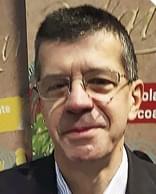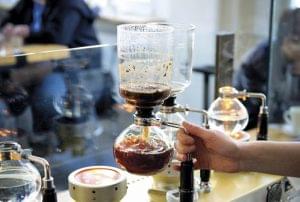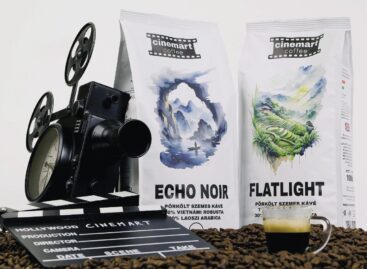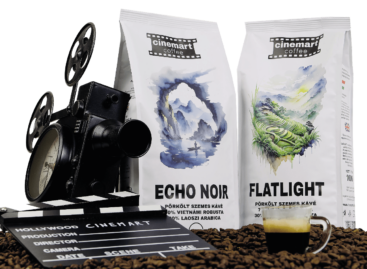A more colourful coffee segment
In the last few years the Hungarian coffee market was growing at increasing speed, in terms of both volume and value sales.

Enikő Boglárka
Tóth
key account manager
Nestlé Professional
According to Enikő Boglárka Tóth, key account manager of Nestlé Professional, 2018 brought further strengthening for the whole bean coffee and the capsule segments. Among whole bean coffees single origin, 100 percent Arabica and various special roast products are more and more popular. Ready-to-drink (RTD) sales have also augmented considerably.

Péter Szabó
managing director
Bravos
Péter Szabó, managing director of Bravos told: besides higher whole bean coffee sales, demand also increased for coffee blends. Organic coffees and certified products are purchased more often than before. Having a cup of coffee isn’t a functional act anymore but a source of joy. Mr Szabó predicts that the popularity of whole bean coffee will continue to grow in 2019.

Tamás Baranyay
marketing manager
JDE
Tamás Baranyay, marketing manager of JDE pointed out that sales in the whole bean and the capsule segments had been increasing by two-digit number for years. Since these products cost more than the average, there is a premiumisation process taking place in coffee market. In Hungary espresso has remained the dominant coffee type.

Zsuzsanna Leitold
PR co-ordinator
Nespresso division
Nestlé Hungária
Zsuzsanna Leitold, PR coordinator of Nestlé Hungária’s Nespresso division talked to our magazine about the restructuring of the coffee market: sales of premium portioned coffees and especially capsule products have been growing more dynamically than before. Nespresso is still the market leader in the premium capsule coffee segment.

Dóra Szeles
Lavazza Coffee
development manager
Coca-Cola HBC
Magyarország
Dóra Szeles, Lavazza coffee development manager at Coca-Cola HBC Magyarország revealed that 2018 brought a major change in retail, as strong brands entered the Nespresso-compatible capsule market. The instant coffee segment retained its market share, value sales of ground and roasted coffees dropped a little, plus whole bean coffee sales kept increasing in Ms Szeles’ opinion too. She added that consumers are now interested in the topic of coffee. Cafés, bars and restaurants serve many specialties and new-wave style coffees, and even the traditional varieties represent higher quality than before.

Oszkár Laknerfi
sales and marketing
director
Mokate
Oszkár Laknerfi, sales and marketing director of Mokate reckons that recently the biggest change has been the conquest of whole bean coffees. The main reason of this was the considerable drop in the price of coffee grinders. It has also helped the coffee segment that Hungarians have started to earn more, therefore even the average consumer can try special brews or premium coffees, or have a nice cup of coffee outside of their homes. The coffee segment is more colourful now than ever before.

Ákos Zádor
sales director
Pannon Kávé
Ákos Zádor, sales director of Pannon Kávé Kft. told Trade magazin that they had sensed no drastic change in the coffee market in the last few years. However, the already existing trends got even stronger. For a growing number of consumers coffee isn’t the daily dose of caffeine anymore, but a culinary experience. When it comes to making coffee at home, the average consumer isn’t experimenting, they opt for a comfortable solution such as capsule systems or automatic coffee makers.

Péter Juhász
chief operating officer
Caff é Perté
Péter Juhász, chief operating officer of Caffé Perté revealed that one of the most spectacular changes had been the appearance of so-called ‘mini roasteries’ and speciality cafés. He made it clear that coffee roasted in the Italian style is still the most popular variety in Hungary. In the last few years sales of capsule systems surged by 30-40 percent at global level.

Zoltán Mihályi
managing director
Caffé Vergnano
Zoltán Mihályi, managing director of Caffé Vergnano informed us that in the retail channel sales of whole bean and portioned coffees are rising, while in the HoReCa channel more and more partners purchase expensive blends. The company is also experimenting with online sales and they plan to enter the office and hotel segments too.

Ferenc Sirály
co-owner
Caffé Service
Ferenc Sirály, co-owner of Caffé Service Kft. hopes that the share of capsule coffees will increase in the OCS sector too. The company is convinced that this coffee type is the best solution for smaller offices and home consumption too. He thinks that vending machines also form an important part of the coffee segment, although their significance is reducing – what they lose in sales mainly goes to the HoReCa channel.

Ms Tóth pointed out that brands are important for consumers. She explained that NESCAFÉ products and the accessories sold by Nestlé Professional all come with the responsibility taken by the manufacturer and the suppliers – this is important for today’s conscious consumers. Mr Baranyay believes that educating consumers is the interest of coffee companies too, as more knowledgeable consumers will try more coffee varieties. Mr Laknerfi is of the opinion that consumers are more likely to accept the premium price of a premium product if they know the reason why it is more expensive. Mr Zádor explained to our magazine that it isn’t enough to put the ‘premium product’ sticker on a coffee anymore: the statement also needs to be proven to partners, which means that the company’s workers need to be trained to be able to do so. Mr Szabó stressed: in spite of the fact that the Hungarian market is going in the direction of quality coffees, the price-value ratio is still a key factor in the retail channel.
Ms Szeles underlined the fact that consumers need to be educated at every level and in every channel. In the Lavazza Training Centre the company gives employees and partners the chance to learn about coffee regularly. Ms Leitold told us that education is one of their objectives with their limited edition capsules, and with the new Master Origin coffees. As for the HoReCa market, the company provides 24/7 repair and maintenance service to top partners and organises barista trainings too. Mr Juhász revealed that demand is increasing for ‘home barista’ trainings as well, which means that more and more consumers like to experiment with coffee in their homes. Mr Sirály spoke to us about the importance of popularising organic and fair trade products. Mr Mihályi shed light on the fact that his company works hard to communicate the values and quality of the brand to consumers – they are active in social media and participate in various coffee-related events.

Ms Szeles thinks that cold coffees haven’t become widely popular in Hungary yet. As for cold brews, which are made using a completely new technology, they have established a completely new category in coffee consumption. Mr Baranyay agreed that cold coffees is still a niche segment in Hungary. According to Mr Szabó, cold brews are popular in new-wave cafés. In his view creamy nitro cold brews also have the chance to become popular soon. Ms Leitold told: every summer they come out with limited edition capsules, which have been developed especially for making iced coffee. Young consumers seem to like these cold varieties and coffee cocktails as well. Mr Mihályi shared the news that in 2019 they would be testing Caffé Vergnano’s compact cold brew system with some partners. Mr Zádor thinks cold coffees can be the competitors of energy drinks in the long run; even more so because they are healthier. Mr Juhász opines that new technologies such as cold brew and cold drip put the individual characteristics of certain coffee varieties and growing areas in the limelight. //
Related news
Experience instead of routine
🎧 Hallgasd a cikket: Lejátszás Szünet Folytatás Leállítás Nyelv: Auto…
Read more >A cup of creativity…
🎧 Hallgasd a cikket: Lejátszás Szünet Folytatás Leállítás Nyelv: Auto…
Read more >Related news
France remains the world’s number one tourist destination
🎧 Hallgasd a cikket: Lejátszás Szünet Folytatás Leállítás Nyelv: Auto…
Read more >The Balaton House of the Year awards were presented
🎧 Hallgasd a cikket: Lejátszás Szünet Folytatás Leállítás Nyelv: Auto…
Read more >(HU) Tudatos Vendéglátók Konferenciája 2026
🎧 Hallgasd a cikket: Lejátszás Szünet Folytatás Leállítás Nyelv: Auto…
Read more >







